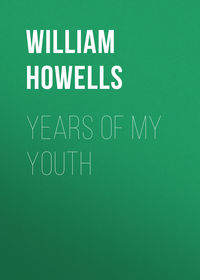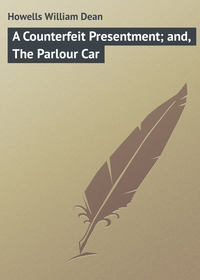 полная версия
полная версияA Boy's Town
My boy's brother had a good many friends who were too old for my boy to play with. One of them had a father that had a flour-mill out at the First Lock, and for a while my boy's brother intended to be a miller. I do not know why he gave up being one; he did stay up all night with his friend in the mill once, and he found out that the water has more power by night than by day, or at least he came to believe so. He knew another boy who had a father who had a stone-quarry and a canal-boat to bring the stone to town. It was a scow, and it was drawn by one horse; sometimes he got to drive the horse, and once he was allowed to steer the boat. This was a great thing, and it would have been hard to believe of anybody else. The name of the boy that had the father that owned this boat was Piccolo; or, rather, that was his nickname, given him because he could whistle like a piccolo-flute. Once the fellows were disputing whether you could jump halfway across a narrow stream, and then jump back, without touching your feet to the other shore. Piccolo tried it, and sat down in the middle of the stream.
My boy's brother had a scheme for preserving ripe fruit, by sealing it up in a stone jug and burying the jug in the ground, and not digging it up till Christmas. He tried it with a jug of cherries, which he dug up in about a week; but the cherries could not have smelt worse if they had been kept till Christmas. He knew a boy that had a father that had a bakery, and that used to let him come and watch them making bread. There was a fat boy learning the trade there, and they called him the dough-baby, because he looked so white and soft; and the boy whose father had a mill said that down at the German brewery they had a Dutch boy that they were teaching to drink beer, so they could tell how much beer a person could drink if he was taken early; but perhaps this was not true.
My boy's brother went to all sorts of places that my boy was too shy to go to; and he associated with much older boys, but there was one boy who, as I have said, was the dear friend of both of them, and that was the boy who came to learn the trade in their father's printing-office, and who began an historical romance at the time my boy began his great Moorish novel. The first day he came he was put to roll, or ink the types, while my boy's brother worked the press, and all day long my boy, from where he was setting type, could hear him telling the story of a book he had read. It was about a person named Monte Cristo, who was a count, and who could do anything. My boy listened with a gnawing literary jealousy of a boy who had read a book that he had never heard of. He tried to think whether it sounded as if it were as great a book as the "Conquest of Granada," or "Gesta Romanorum;" and for a time he kept aloof from this boy because of his envy. Afterwards they came together on "Don Quixote," but though my boy came to have quite a passionate fondness for him, he was long in getting rid of his grudge against him for his knowledge of "Monte Cristo." He was as great a laughter as my boy and his brother, and he liked the same sports, so that two by two, or all three together, they had no end of jokes and fun. He became the editor of a country newspaper, with varying fortunes but steadfast principles, and when the war broke out he went as a private soldier. He soon rose to be an officer, and fought bravely in many battles. Then he came back to a country-newspaper office where, ever after, he continued to fight the battles of right against wrong, till he died not long ago at his post of duty – a true, generous, and lofty soul. He was one of those boys who grow into the men who seem commoner in America than elsewhere, and who succeed far beyond our millionaires and statesmen in realizing the ideal of America in their nobly simple lives. If his story could be faithfully written out, word for word, deed for deed, it would be far more thrilling than that of Monte Cristo, or any hero of romance; and so would the common story of any common life; but we cannot tell these stories, somehow.
My boy knew nearly a hundred boys, more or less; but it is no use trying to tell about them, for all boys are a good deal alike, and most of these did not differ much from the rest. They were pretty good fellows; that is to say, they never did half the mischief they intended to do, and they had moments of intending to do right, or at least they thought they did, and when they did wrong they said they did not intend to. But my boy never had any particular friend among his schoolmates, though he played and fought with them on intimate terms, and was a good comrade with any boy that wanted to go in swimming or out hunting. His closest friend was a boy who was probably never willingly at school in his life, and who had no more relish of literature or learning in him than the open fields, or the warm air of an early spring day. I dare say it was a sense of his kinship with nature that took my boy with him, and rested his soul from all its wild dreams and vain imaginings. He was like a piece of the genial earth, with no more hint of toiling or spinning in him; willing for anything, but passive, and without force or aim. He lived in a belated log-cabin that stood in the edge of a corn-field on the river-bank, and he seemed, one day when my boy went to find him there, to have a mother, who smoked a cob-pipe, and two or three large sisters who hulked about in the one dim, low room. But the boys had very little to do with each other's houses, or, for that matter, with each other's yards. His friend seldom entered my boy's gate, and never his door; for with all the toleration his father felt for every manner of human creature, he could not see what good the boy was to get from this queer companion. It is certain that, he got no harm; for his companion was too vague and void even to think evil. Socially, he was as low as the ground under foot, but morally he was as good as any boy in the Boy's Town, and he had no bad impulses. He had no impulses at all, in fact, and of his own motion he never did anything, or seemed to think anything. When he wished to get at my boy, he simply appeared in the neighborhood, and hung about the outside of the fence till he came out. He did not whistle, or call "E-oo-we!" as the other fellows did, but waited patiently to be discovered, and to be gone off with wherever my boy listed. He never had any plans himself, and never any will but to go in swimming; he neither hunted nor foraged; he did not even fish; and I suppose that money could not have hired him to run races. He played marbles, but not very well, and he did not care much for the game. The two boys soaked themselves in the river together, and then they lay on the sandy shore, or under some tree, and talked; but my boy could not have talked to him about any of the things that were in his books, or the fume of dreams they sent up in his mind. He must rather have soothed against his soft, caressing ignorance the ache of his fantastic spirit, and reposed his intensity of purpose in that lax and easy aimlessness. Their friendship was not only more innocent than any other friendship my boy had, but it was wholly innocent; they loved each other, and that was all; and why people love one another there is never any satisfactory telling. But this friend of his must have had great natural good in him; and if I could find a man of the make of that boy I am sure I should love him.
My boy's other friends wondered at his fondness for him, and it was often made a question with him at home, if not a reproach to him; so that in the course of time it ceased to be that comfort it had been to him. He could not give him up, but he could not help seeing that he was ignorant and idle, and in a fatal hour he resolved to reform him. I am not able now to say just how he worked his friend up to the point of coming to school, and of washing his hands and feet and face, and putting on a new check shirt to come in. But one day he came, and my boy, as he had planned, took him into his seat, and owned his friendship with him before the whole school. This was not easy, for though everybody knew how much the two were together, it was a different thing to sit with him as if he thought him just as good as any boy, and to help him get his lessons, and stay him mentally as well as socially. He struggled through one day, and maybe another; but it was a failure from the first moment, and my boy breathed freer when his friend came one half-day, and then never came again. The attempted reform had spoiled their simple and harmless intimacy. They never met again upon the old ground of perfect trust and affection. Perhaps the kindly earth-spirit had instinctively felt a wound from the shame my boy had tried to brave out, and shrank from their former friendship without quite knowing why. Perhaps it was my boy who learned to realize that there could be little in common but their common humanity between them, and could not go back to that. At any rate, their friendship declined from this point; and it seems to me, somehow, a pity.
Among the boys who were between my boy and his brother in age was one whom all the boys liked, because he was clever with everybody, with little boys as well as big boys. He was a laughing, pleasant fellow, always ready for fun, but he never did mean things, and he had an open face that made a friend of every one who saw him. He had a father that had a house with a lightning-rod, so that if you were in it when there was a thunder-storm you could not get struck by lightning, as my boy once proved by being in it when there was a thunder-storm and not getting struck. This in itself was a great merit, and there were grape-arbors and peach-trees in his yard which added to his popularity, with cling-stone peaches almost as big as oranges on them. He was a fellow who could take you home to meals whenever he wanted to, and he liked to have boys stay all night with him; his mother was as clever as he was, and even the sight of his father did not make the fellows want to go and hide. His father was so clever that he went home with my boy one night about midnight when the boy had come to pass the night with his boys, and the youngest of them had said he always had the nightmare and walked in his sleep, and as likely as not he might kill you before he knew it. My boy tried to sleep, but the more he reflected upon his chances of getting through the night alive the smaller they seemed; and so he woke up his potential murderer from the sweetest and soundest slumber, and said he was going home, but he was afraid; and the boy had to go and wake his father. Very few fathers would have dressed up and gone home with a boy at midnight, and perhaps this one did so only because the mother made him; but it shows how clever the whole family was.
It was their oldest boy whom my boy and his brother chiefly went with before that boy who knew about "Monte Cristo" came to learn the trade in their father's office. One Saturday in July they three spent the whole day together. It was just the time when the apples are as big as walnuts on the trees, and a boy wants to try whether any of them are going to be sweet or not. The boys tried a great many of them, in an old orchard thrown open for building-lots behind my boy's yard; but they could not find any that were not sour; or that they could eat till they thought of putting salt on them; if you put salt on it, you could eat any kind of green apple, whether it was going to be a sweet kind or not. They went up to the Basin bank and got lots of salt out of the holes in the barrels lying there, and then they ate all the apples they could hold, and after that they cut limber sticks off the trees, and sharpened the points, and stuck apples on them and threw them. You could send an apple almost out of sight that way, and you could scare a dog almost as far as you could see him.
On Monday my boy and his brother went to school, but the other boy was not there, and in the afternoon they heard he was sick. Then, towards the end of the week they heard that he had the flux; and on Friday, just before school let out, the teacher – it was the one that whipped so, and that the fellows all liked – rapped on his desk, and began to speak very solemnly to the scholars. He told them that their little mate, whom they had played with and studied with, was lying very sick, so very sick that it was expected he would die; and then he read them a serious lesson about life and death, and tried to make them feel how passing and uncertain all things were, and resolve to live so that they need never be afraid to die.
Some of the fellows cried, and the next day some of them went to see the dying boy, and my boy went with them. His spirit was stricken to the earth, when he saw his gay, kind playmate lying there, white as the pillow under his wasted face, in which his sunken blue eyes showed large and strange. The sick boy did not say anything that the other boys could hear, but they could see the wan smile that came to his dry lips, and the light come sadly into his eyes, when his mother asked him if he knew this one or that; and they could not bear it, and went out of the room.
In a few days they heard that he was dead, and one afternoon school did not keep, so that the boys might go to the funeral. Most of them walked in the procession; but some of them were waiting beside the open grave, that was dug near the grave of that man who believed there was a hole through the earth from pole to pole, and had a perforated stone globe on top of his monument.
XVII.
FANTASIES AND SUPERSTITIONS
My boy used to be afraid of this monument, which stood a long time, or what seemed to him a long time, in the yard of the tombstone cutter before it was put up at the grave of the philosopher who imagined the earth as hollow as much of the life is on it. He was a brave officer in the army which held the region against the Indians in the pioneer times; he passed the latter part of his life there, and he died and was buried in the Boy's Town. My boy had to go by the yard when he went to see his grandmother, and even at high noon the sight of the officer's monument, and the other gravestones standing and leaning about, made his flesh creep and his blood run cold. When there were other boys with him he would stop at the door of the shed, where a large, fair German was sawing slabs of marble with a long saw that had no teeth, and that he eased every now and then with water from a sponge he kept by him; but if the boy was alone, and it was getting at all late in the afternoon, he always ran by the place as fast as he could. He could hardly have told what he was afraid of, but he must have connected the gravestones with ghosts.
His superstitions were not all of the ghastly kind; some of them related to conduct and character. It was noted long ago how boys throw stones, for instance, at a tree, and feign to themselves that this thing or that, of great import, will happen or not as they hit or miss the tree. But my boy had other fancies, which came of things he had read and half understood. In one of his school-books was a story that began, "Charles was an honest boy, but Robert was the name of a thief," and it went on to show how Charles grew up in the respect and affection of all who knew him by forbearing to steal some oranges which their owner had set for safe-keeping at the heels of his horse, while Robert was kicked at once (there was a picture that showed him holding his stomach with both hands), and afterwards came to a bad end, through attempting to take one. My boy conceived from the tale that the name of Robert was necessarily associated with crime; it was long before he outgrew the prejudice; and this tale and others of a like vindictive virtuousness imbued him with such a desire to lead an upright life that he was rather a bother to his friends with his scruples. A girl at school mislaid a pencil which she thought she had lent him, and he began to have a morbid belief that he must have stolen it; he became frantic with the mere dread of guilt; he could not eat or sleep, and it was not till he went to make good the loss with a pencil which his grandfather gave him that the girl said she had found her pencil in her desk, and saved him from the despair of a self-convicted criminal. After that his father tried to teach him the need of using his reason as well as his conscience concerning himself, and not to be a little simpleton. But he was always in an anguish to restore things to their owners, like the good boys in the story-books, and he suffered pangs of the keenest remorse for the part he once took in the disposition of a piece of treasure-trove. This was a brown-paper parcel which he found behind a leaning gravestone in the stone-cutter's yard, and which he could not help peeping into. It was full of raisins, and in the amaze of such a discovery he could not help telling the other boys. They flocked round and swooped down upon the parcel like birds of prey, and left not a raisin behind. In vain he implored them not to stain their souls with this misdeed; neither the law nor the prophets availed; neither the awful shadow of the prison which he cast upon them, nor the fear of the last judgment which he invoked. They said that the raisins did not belong to anybody; that the owner had forgotten all about them; that they had just been put there by some one who never intended to come back for them. He went away sorrowing, without touching a raisin (he felt that the touch must have stricken him with death), and far heavier in soul than the hardened accomplices of his sin, of whom he believed himself the worst in having betrayed the presence of the raisins to them.
He used to talk to himself when he was little, but one day his mother said to him jokingly, "Don't you know that he who talks to himself has the devil for a listener?" and after that he never dared whisper above his breath when he was alone, though his father and mother had both taught him that there was no devil but his own evil will. He shuddered when he heard a dog howling in the night, for that was a sign that somebody was going to die. If he heard a hen crow, as a hen sometimes unnaturally would, he stoned her, because it was a sign of the worst kind of luck. He believed that warts came from playing with toads, but you could send them away by saying certain words over them; and he was sorry that he never had any warts, so that he could send them away, and see them go; but he never could bear to touch a toad, and so of course he could not have warts. Other boys played with toads just to show that they were not afraid of having warts; but every one knew that if you killed a toad, your cow would give bloody milk. I dare say the far forefathers of the race knew this too, when they first began to herd their kine in the birthplace of the Aryan peoples; and perhaps they learned then that if you killed a snake early in the day its tail would live till sundown. My boy killed every snake he could; he thought it somehow a duty; all the boys thought so; they dimly felt that they were making a just return to the serpent-tribe for the bad behavior of their ancestor in the Garden of Eden. Once, in a corn-field near the Little Reservoir, the boys found on a thawing day of early spring knots and bundles of snakes writhen and twisted together, in the torpor of their long winter sleep. It was a horrible sight, that afterwards haunted my boy's dreams. He had nightmares which remained as vivid in his thoughts as anything that happened to him by day. There were no poisonous snakes in the region of the Boy's Town, but there were some large blacksnakes, and the boys said that if a blacksnake got the chance he would run up your leg, and tie himself round your body so that you could not breathe. Nobody had ever seen a blacksnake do it, and nobody had ever seen a hoop-snake, but the boys believed there was such a snake, and that he would take his tail in his mouth, when he got after a person, and roll himself along swifter than the fastest race-horse could run. He did not bite, but when he came up with you he would take the point of his tail out of his mouth and strike it into you. If he struck his tail into a tree, the tree would die. My boy had seen a boy who had been chased by a hoop-snake, but he had not seen the snake, though for the matter of that the boy who had been chased by it had not seen it either; he did not stop to see it. Another kind of snake that was very strange was a hair-snake. No one had ever seen it happen, but every one knew that if you put long horsehairs into a puddle of water and let them stay, they would turn into hair-snakes; and when you drank out of a spring you had to be careful not to swallow a hair-snake, or it would remain in your stomach and grow there.
When you saw a lizard, you had to keep your mouth tight shut, or else the lizard would run down your throat before you knew it. That was what all the boys said, and my boy believed it, though he had never heard of anybody that it happened to. He believed that if you gave a chicken-cock burnt brandy it could lay eggs, and that if you gave a boy burnt brandy it would stop his growing. That was the way the circus-men got their dwarfs, and the India-rubber man kept himself limber by rubbing his joints with rattlesnake oil.
A snake could charm a person, and when you saw a snake you had to kill it before it could get its eye on you or it would charm you. Snakes always charmed birds; and there were mysterious powers of the air and forces of nature that a boy had to be on his guard against, just as a bird had to look out for snakes. You must not kill a granddaddy-long-legs, or a lady-bug; it was bad luck. My boy believed, or was afraid he believed, that
"What you dream Monday morning before daylightWill come true before Saturday night,"but if it was something bad, you could keep it from coming true by not telling your dream till you had eaten breakfast. He governed his little, foolish, frightened life not only by the maxims he had learned out of his "Gesta Romanorum," but by common sayings of all sorts, such as
"See a pin and leave it layYou'll have bad luck all the day,"and if ever he tried to rebel against this slavery, and went by a pin in the path, his fears tormented him till he came back and picked it up. He would not put on his left stocking first, for that was bad luck; but besides these superstitions, which were common to all the boys, he invented superstitions of his own, with which he made his life a burden. He did not know why, but he would not step upon the cracks between the paving-stones, and some days he had to touch every tree or post along the sidewalk, as Doctor Johnson did in his time, though the boy had never heard of Doctor Johnson then.
While he was yet a very little fellow, he had the distorted, mistaken piety of childhood. He had an abject terror of dying, but it seemed to him that if a person could die right in the centre isle of the church – the Methodist church where his mother used to go before she became finally a New Churchwoman – the chances of that person's going straight to heaven would be so uncommonly good that he need have very little anxiety about it. He asked his mother if she did not think so too, holding by her hand as they came out of church together, and he noticed the sort of gravity and even pain with which she and his father received this revelation of his darkling mind. They tried to teach him what they thought of such things; but though their doctrine caught his fancy and flattered his love of singularity, he was not proof against the crude superstitions of his mates. He thought for a time that there was a Bad Man, but this belief gave way when he heard his father laughing about a certain clergyman who believed in a personal devil.
The boys said the world was going to be burned up some time, and my boy expected the end with his full share of the trouble that it must bring to every sinner. His fears were heightened by the fact that his grandfather believed this end was very near at hand, and was prepared for the second coming of Christ at any moment. Those were the days when the minds of many were stirred by this fear or hope; the believers had their ascension robes ready, and some gave away their earthly goods so as not to be cumbered with anything in their heavenward flight. At home, my boy heard his father jest at the crazy notion, and make fun of the believers; but abroad, among the boys, he took the tint of the prevailing gloom. One awful morning at school, it suddenly became so dark that the scholars could not see to study their lessons, and then the boys knew that the end of the world was coming. There were no clouds, as for a coming storm, but the air was blackened almost to the dusk of night; the school was dismissed, and my boy went home to find the candles lighted, and a strange gloom and silence on everything outside. He remembered entering into this awful time, but he no more remembered coming out of it than if the earth had really passed away in fire and smoke.









